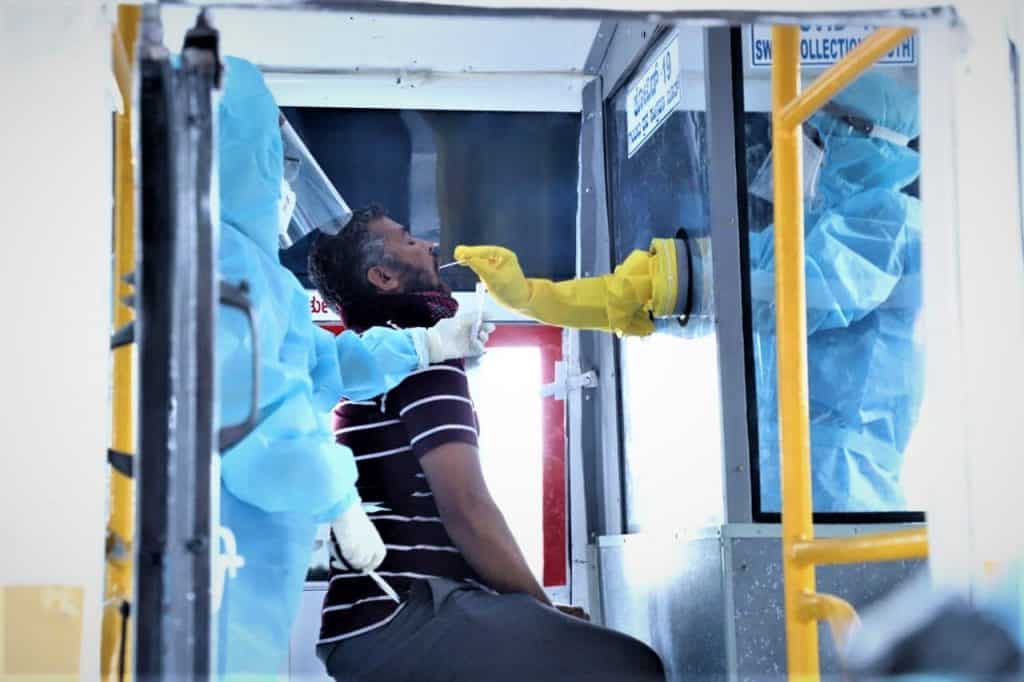With some health experts predicting an increase in COVID-19 cases during January, the next 40 days could well be crucial in assessing the spread and effects of the Omicron sub-variant BF.7 in the country. Bengalureans appear to once again be experiencing COVID-19 anxiety as the city is seeing a small uptick in cases.
Citizen Matters reported about the immediate COVID-19 protocols taken in December 2022. However, in the past week, cases in the city increased on an average of 32 cases per day, while active cases stood at 266.
Prime Minister Narendra Modi and Union Health Minister Mansukh Mandaviya have held meetings to examine the country’s preparedness to deal with any sudden surge in cases. Mansukh Mandaviya said RT-PCR tests have been made mandatory for flyers coming from China, Hong Kong, Japan, South Korea, Singapore, and Thailand from January 1 2023. He added that they will have to upload their reports on the Air Suvidha portal before travel. Mock drills are being conducted at medical facilities all over India to assess operational readiness to handle any spike in COVID-19 infections.
After three consecutive days of reduction in cases, on January 5th, India reported a higher number of 175 new cases. The Omicron sub-variant BF.7 is said to be the cause of the most recent increase in cases. The BF.7 sub-variant has a very high transmissibility, according to reports.
Guidelines for international travellers
The central government has issued an alert and ordered states and Union territories to be ready for any eventuality. For asymptomatic international travellers arriving from COVID-19 high-risk nations, the Karnataka state health department has withdrawn its directive requiring seven days of home quarantine and asked travellers to abide by the centre’s guidelines in this regard.
Fourth booster shot for healthcare workers
A doctor at KC General Hospital, Bengaluru, said that they do not have any dedicated COVID-19 wards at present. However, they are waiting for the health department guidelines.
The Indian Medical Association, meanwhile, wants the government to consider allowing a fourth booster shot for doctors and other frontline health workers to protect them from any impending COVID-19 surge in the country.
Read more: COVID-19 fears back: Measures that Bengaluru is taking
“For now, we have enough beds for COVID-19 patients as well as a seperate area to quarantine them,” said an official of Health India Hospital, Taverekere. “No guidelines have been given so far to increase beds as it is important to treat patients with other illnesses as well and we want beds for them too. If there is a surge in case, we will increase the beds but for now the situation is under control.”
Safety measures in schools and restaurants
While wearing masks in indoor spaces is being advised, it has not been made a punishable offence. Many restaurants in the city are, however, once again implementing safety measures. Restaurant owners are making every effort to ensure the safety of their customers, from reintroducing the usage of masks and sanitisers to monitoring the body temperatures of the staff and visitors.

“Our restaurant usually gets more dine in customers and it gets really crowded on weekends,” says Kashyap Doshi, the owner of Gramins, Koramangala. “Keeping in mind the COVID-19 protocols, we have reintroduced all COVID-19 guidelines and ensure that it is being followed. Both the staff and customers are asked to mask up and get their temperature checked while entering the restaurant.”
Read more: Is Bengaluru prepared enough to tackle COVID third wave?
Private school administrators in Bengaluru too are stepping up efforts to ensure safety precautions are in place, amid recommendations from the state health department to ramp up health protocols. The majority of schools in Bengaluru require students to wear masks and have their temperature checked. Children are also advised to skip school if they have a cold, cough or fever. The schools also have sanitised classrooms and buses.
Meanwhile, some schools have adopted a wait and watch policy. “We are yet to receive any orders from the government regarding school guidelines,” said a staff member of Christ School. “However, we are prepared for any situation. Safety of our students and staff is a priority for us.” Students and faculty at Bangalore University are now required to wear masks and receive booster shots inside the campus.
Many yet to get a booster dose
As Bengaluru steps up COVID-19 measures, Bengaluru airport is all set to screen fliers, if needed, in the coming days. Karnataka Health Minister K Sudhakar said even though the government was able to reach 100% of the population with two doses, many people are yet to receive a precautionary dose. He urged those who didn’t get a booster shot to get done. He stressed that the focus is on making people aware about the booster dose.
It is also recommended that people get tested for COVID-19 if they experience symptoms including fever, sore throat, runny nose, and cough. Meanwhile, the BBMP has written to the government requesting five lakh doses due to a lack of Covishield booster doses in the city. There also seems to be an increase in demand for masks and hand sanitisers in pharmacies.